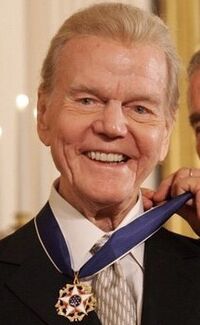Paul Harvey
Hello, Americans! Stay tuned....for article!
Section One.
Paul Harvey Aurandt (September 4, 1918 – February 28, 2009) was an American talk radio broadcaster for ABC using the name Paul Harvey. He narrated News and Comment on weekday mornings. It was an era in which one had to add and Comment to inject your own two cents, rather than just doing it — and an era in which two cents was worth something. For the benefit of farmers who hated weekends and wanted the week to keep on going, Harvey presented a Saturday noon program called The Rest of the Story. Saturday itself became known as the "day of The Rest". His broadcasts reached 24 million readers, and lasted for 58 years, though some programs did not seem quite that long. You know the news. But now you're go-ing to read...
...the rest...of the article!
Section Two.
Harvey grew up in Tulsa, Oklahoma, the son of a policeman. He had a teacher who admired his voice — as you, Gentle Reader, surely had as well, only you didn't do anything about it. But Harvey did. He went to work at radio station KVOO, emptying a trash can here, sharpening a pencil there. Sure enough — like an Uncyclopedia editor who suddenly finds there are no Admins and is pressed into service — off-mic tasks gave way to on-mic tasks, Harvey first reading copy of advertising and eventually gathering, presenting, and managing the news for a variety of stations.
Harvey was in Hawaii covering the U.S. Navy as it built up its fleet, and as the Japanese Navy bombed it to smithereens. Once again, being in the right place led to a job, as Harvey enlisted in the Army Air Forces. However, he re-enlisted back in the civilian population a scant three months later and, though he reported a ton of news, he always insisted, "I cannot tell you the exact wording on my discharge." Radio audiences never knew the rest...
...of that story.
Section Three.
Finally, peacetime. Harvey hosted a broadcast for returning military veterans, adding The Rest of the Story in 1946. The rest...
...of one fateful story was that armed security at the Argonne National Laboratory, 20 miles west of Chicago, was laughably lax. He touched on this theme during several broadcasts, then on February 6, 1951, set out to prove his assertions. He scaled a barbed-wire fence at Argonne, was apprehended, and prosecutors found in his automobile the first four pages of a future broadcast that were to describe Harvey entering the vital nuclear laboratories by simply walking in the front door. Harvey faced a federal indictment for espionage and ruination of his credibility. The rest...
...of that story is that he was neither executed nor shunned. Instead, his news program finally went national, scheduled for noontime on the ABC Radio Network and written and produced by his son, who had the same three names and likewise elected not to use the last one. The show lasted 33 years and eventually netted him $10 million a year.
Section Four.
Harvey's style was legendary and utterly, utterly impossible to imitate. It featured numerous catch-phrases, pregnant...
...pauses for effect, and seamless transitions from editorial content into advertisements. Why, you might hear an advertisement and believe that it was...the news! Salon.com believes Harvey misled his audience by delivering these spots with such conviction that the helpless listener never had a chance to go to the kitchen for another beer. Harvey pitched EdenPure heaters and Bose radios. He lived too early to sleep on MyPillow, but creator Mike Lindell would surely have been an advertiser as well. Several of Harvey's products drew scrutiny from the Federal Trade Commission but, like the Argonne spectacle, Harvey himself always stayed just ahead of the Long Arm of the Law.
Harvey's personal tastes were summed up in his obituary in the New York Times: "He railed against welfare cheats; defended the death penalty; and championed rugged individualism, love of God and country, and the decency of ordinary people." These contemptible opinions, and his upbringing in the sparsely populated land of boomer rubes, earned the ire not only of Salon.com but of Wikipedia, which has cobbled together a narrative that suggests that his policeman father, who was killed by four masked robbers in 1921, had his assailants identified even though they were wearing masks, and had the Ku Klux Klan at his funeral. This would show that Harvey's subversive political opinions were not authentic but merely the result of upbringing by a racist. But on a lighter note...
Section Five.
Harvey, like many federally licensed broadcasters, developed a love for several other things that require a federal license, notably, aviation. And John Edgar Hoover; Harvey's era not only was one in which two cents was worth something, but Hoover as well, before he was revealed to be as gay as a three-cent coin, and in an era in which that was something bad. Hoover's friendship did not require a federal license. But listeners might have been perturbed if they had known that the Director of the FBI could read Harvey's scripts before Harvey read them to you. However, this federal friendship might have kept Harvey out of a federal electric chair.
President George W. Bush gave Harvey the Presidential Medal of Freedom, for inspiring Americans with his positive view of them, as well as singlehandedly inventing Gonzo journalism with his "escapade" at Argonne. Bush got a tiny fraction of the abuse that Donald Trump would get for springing the same stunt on Rush Limbaugh during the 2020 State of the Union address. And now, for what it's worth...
See Also.
Steve Harvey. Or perhaps Andy Rooney. And now you know...the rest...of the story.
Good DAY!
| |||||||||||||


